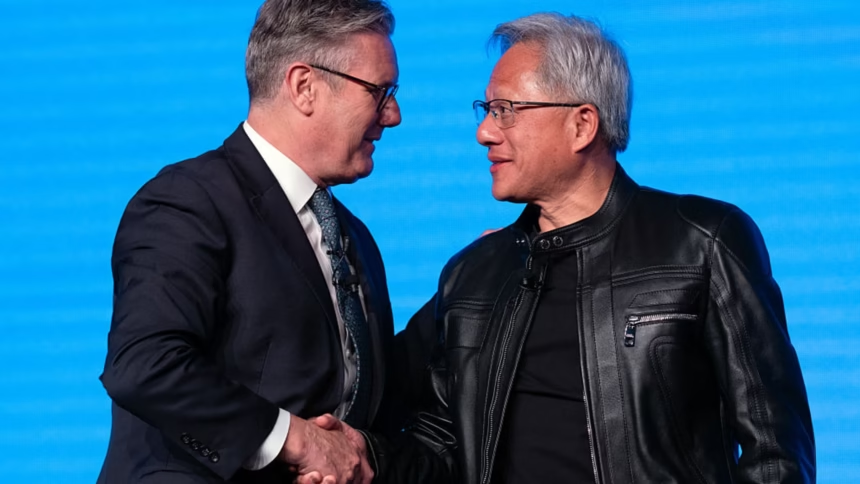This report is from this week’s CNBC’s UK Exchange newsletter. Each Wednesday, Ian King brings you expert insights on the most important business stories from the U.K. and the key personalities shaping the news. The newsletter will also highlight other key developments in the U.K. that you won’t want to miss, plus a preview of essential events that are set to make waves. Like what you see? You can subscribe here.
Her climbdown on denying millions of pensioners the winter fuel allowance was not the only U-turn announced by Rachel Reeves, the U.K.’s chancellor of the Exchequer, this month.
Less significant in political terms, but of far greater importance to the U.K.’s long-term growth potential, was an announcement on June 10 that the government would commit £750 million ($1 billion) worth of funding for a new exascale supercomputer, capable of conducting a quintillion (one billion billion) operations per second, at Edinburgh University.
The news reversed a previous decision, made days after the Labour government was elected in July last year, to pull some £800 million worth of funding for the project announced by former Prime Minister Rishi Sunak’s administration in 2023. Edinburgh had already spent an estimated £30 million on supporting infrastructure and the decision dismayed the U.K.’s scientific community which warned that, at a time when the U.S. has two exascale computers, China has two and both Japan and France are building their own, it would leave Britain lagging its peers.
The timing of the U-turn was no coincidence.
Just two days later, to mark the start of London Tech Week, Prime Minister Keir Starmer shared a platform with Jensen Huang, Nvidia’s founder and CEO, where both talked eagerly about the power of artificial intelligence to transform lives.
During the session, though, Huang had a stark warning for the U.K.
“The U.K. has one of the richest AI communities anywhere on the planet. The deepest thinkers, the best universities in Oxford, Cambridge and Imperial College, amazing startups like DeepMind, Wayve, Synthesia, an incredible research community,” he said.
“It’s just missing one thing. This is the largest AI ecosystem in the world without its own infrastructure.”
Cynics will say that Huang’s message — chipmaker urges more investment in infrastructure that requires chips — does not look that different from a stockbroker urging clients to buy stocks.
It is inconceivable, though, that the government would not have been made aware of it in advance. And restoring funding for the Edinburgh supercomputer suggests the message landed with Starmer and Reeves.
Yet the U.K. tech sector faces other challenges. One is that the U.K.’s AI startups are way behind their American and Chinese peers in the sums they are raising from venture capitalists. That, potentially, is as much of a weakness, longer term, as a shortage of sovereign AI computing infrastructure.
However, a broader worry is that the U.K. may be losing momentum in quantum computing, the revolutionary way of processing information faster than classical computing.
Just up the A40 trunk road, on the same day Starmer was on stage with Huang, the quantum hardware startup Oxford Ionics, a spin-off from the University of Oxford, agreed to a $1.1 billion takeover by Maryland-based IonQ.
The sale has revived concerns, first mooted when the AI start-up DeepMind was bought by Google in 2014, that the U.K. is nothing more than a tech “incubator,” where businesses are born before being scaled up elsewhere.
As Tina Stowell, former chair of the House of Lords Communications and Digital Committee, put it: “I am genuinely sorry about its loss to the U.K. as a British business, even if, under new ownership, it continues to operate here.”
“What we have seen this week is another example of a worrying trend,” she added.
There are fears that other companies in the space may follow suit.
“This [takeover] is a reflection of the top-notch quality of U.K. quantum R&D, built on decades of public funding, but also an example that will be watched closely by other quantum companies seeking capital and opportunities that can be hard to find in the U.K.,” Ashley Montanaro, co-founder and CEO of the quantum software company Phasecraft, wrote in an article for the British tech industry publication UKTN.
“There’s already more public funding available for quantum companies in the U.S. than in the U.K., more fellowships, more state and federal grants and contracts, and more support for scale-up and deployment.”
“Even with President [Donald] Trump’s recent pushback against universities, private capital ultimately follows public money, and several of our peers have joined us in opening labs overseas to access such support, knowledge and capital,” he added.
Highlighting delays to the implementation of the U.K.’s National Quantum Strategy, announced two years ago, he noted there would be no new government funding for quantum computing projects until autumn at the earliest — while at the same time, the U.S was in the process of doubling federal quantum funding and other countries, among them Canada and Finland, had stepped up investment in the field.
Montanaro went on: “Once the talent, capital and momentum go elsewhere, they rarely return.”
The U.K. government’s newly rediscovered passion for supercomputers that will help power the AI revolution is heartwarming. But AI is only one part of the U.K.’s tech ecosystem and the worry must be that, in fields like quantum computing, it is in real danger of falling behind.
The flip side
Meanwhile, although Starmer and his ministers now appear to see AI as an unalloyed force for good, others may disagree.
This week, in a rare interview, Alison Kirkby, BT’s chief executive, told the Financial Times the company’s plans to cut more than 40,000 jobs and strip out £3 billion worth of costs by the end of the decade “did not reflect the full potential of AI”.
She told the paper: “Depending on what we learn from AI … there may be an opportunity for BT to be even smaller by the end of the decade.”
Most of the jobs expected to go under existing plans were those of engineers specifically hired to build BT’s fiber network whose roles became redundant once the project was complete.
The chances are that, in this instance, Kirkby was referring to BT’s call centers, which employ thousands of people in locations including Plymouth, Greenock and North Tyneside, as well as the company’s HR functions.
Starmer and his colleagues may need to persuade the public — and their party’s traditional backers in the trade unions especially — that AI is a force for good rather than just cost-cutting.
— Ian King









